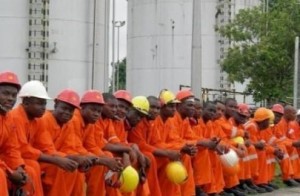NUPENG threatens Strike over Designation of Workers by Multinationals
Following delays over the payment of entitlements to contract workers by the Shell Petroleum Development Company of Nigeria, the Nigerian Union of Petroleum and Natural Gas (NUPENG) workers have given the Federal Government till Friday to intervene in the situation or be faced with an Industrial action.
NUPENG is poised to mobilize its members for a Nationwide strike to state their grievances and displeasure over the way the issue is being handled. It also urged management of Chevron to reverse the termination of appointment of its members, warning that the union will not condone a situation whereby the contractual agreement is terminated and a new contract for service providers created.
NUPENG President, Mr. Igwe Achese, gave the strike notice at a press conference held Tuesday at the union’s secretariat in Lagos.
Achese warned that if the two multinationals fail to address the labour-related issues that have led to the picketing of their offices, the union may be forced to employ more stringent industrial action to pursue its case.
One of the challenges plaguing the Oil Industry has been harsh treatment meted out to contract workers, which has always infuriated the unions in the sector.
On the issue of the Chevron management and the services of its contract workers, the union frowned at the claim that they were given the approval by the Nigerian National Petroleum Corporation to transfer the services of the workers to another service provider.
Speaking further on the picketing of Shell operations in the country and the situation in Chevron, Mr Ahezie said “It is no longer news that we have a great challenge in the oil and gas sector as labour dispute with the two multinationals have been on for over one year. We will not stop at picketing them but hope that government will heed to the union’s call and save Nigerians from the hands of these multinationals who have been enslaving Nigerian workers in the name of contract employment, casualisation and new divestment policy”.
From the trends in the Industry it is expected that the Government would wade in and bring a policy direction in the Oil industry that clamps down on activities that are indicative of enslavement of workers through contract appointment.





